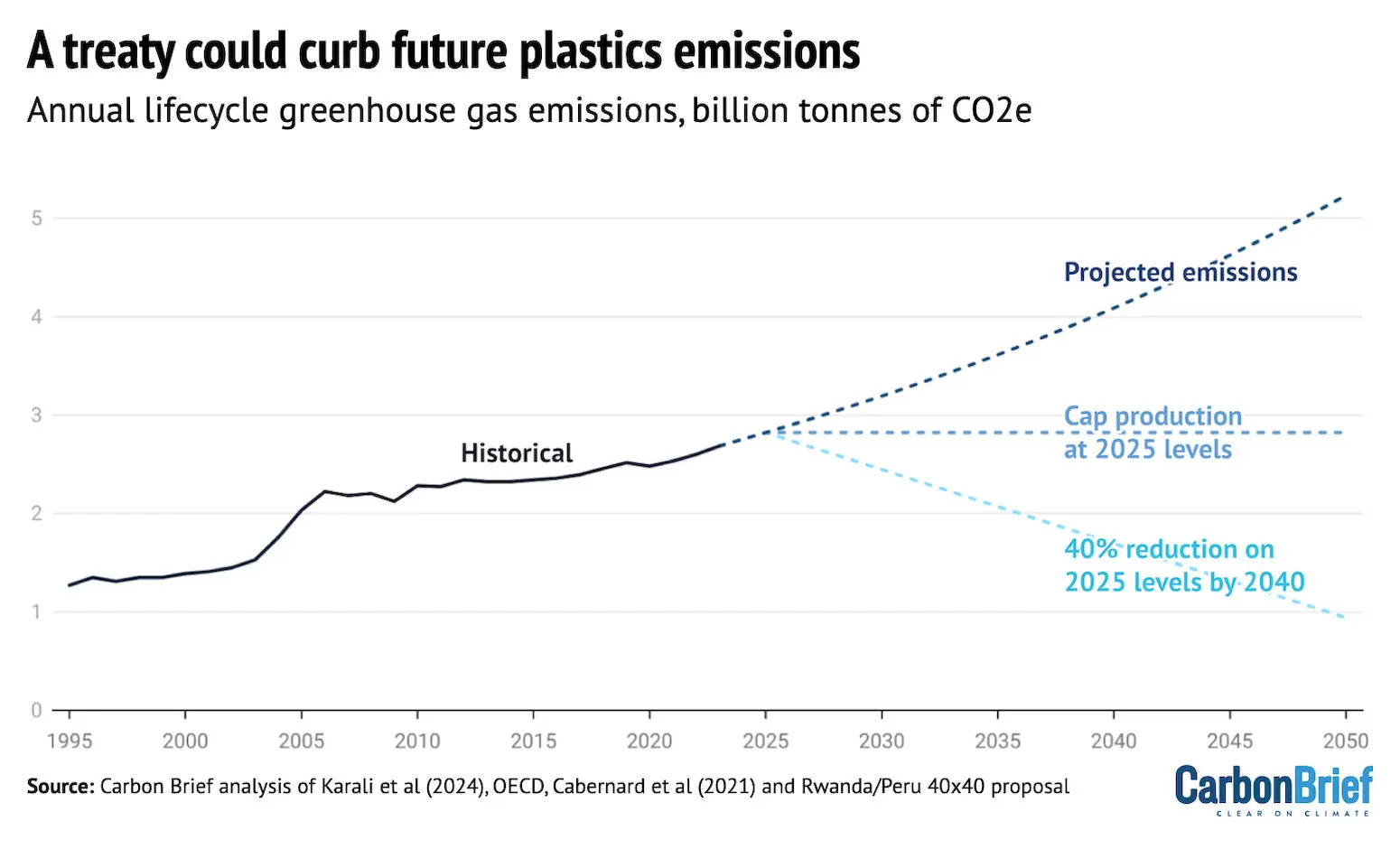
DeBriefed 29 November 2024: COP29 disappoints developing countries; Plastics treaty talks; Brazil’s rocky road to COP30
Yanine Quiroz
11.29.24Yanine Quiroz
29.11.2024 | 1:16pmWelcome to Carbon Brief’s DeBriefed.
An essential guide to the week’s key developments relating to climate change.
This week
COP29 fall-out
FINANCE DEAL: Developed nations agreed to help channel “at least” $300bn a year into developing countries by 2035 to support their efforts to deal with climate change, at the end of fractured talks at COP29 in Azerbaijan. The new climate-finance goal has left developing countries bitterly disappointed, with Nigeria branding it a “joke”. Developing countries had called for developed countries to raise $1.3tn a year.
FOSSIL FUELS: Countries also failed to reach an agreement on how the outcomes of last year’s “global stocktake”, including a key pledge to transition away from fossil fuels, should be taken forward – instead shunting the decision to COP30 next year in Brazil. They did find agreement on the remaining sections of Article 6 on carbon markets, meaning all elements of the Paris Agreement have been finalised nearly 10 years after it was signed. Read Carbon Brief’s in-depth summary of all of the key outcomes from COP29.
NATURE MISSING: Despite taking place just days after a major UN biodiversity summit, COP29 produced few new commitments on food, forests, land and nature. Countries managed to negotiate a text “reaffirming” the “importance of conserving, protecting and restoring nature”. However, countries failed to adopt it by the end of COP. See Carbon Brief’s separate article on key takeaways for food, forests, land and nature.
Around the world
- JAPAN NDC: Japan has published its new UN climate pledge, or “nationally determined contribution” (NDC), aiming to cut emissions by 60% by 2035, compared to 2013 levels, NHK Japan reported.
- EXXON PROBE: Reuters reported that the FBI in the US “has been investigating a longtime Exxon Mobil consultant over the contractor’s alleged role in a hack-and-leak operation that targeted hundreds of the oil company’s biggest critics”, including environmental activists. Exxon compared the allegations to “conspiracy theories”.
- IRELAND ELECTION: Against the backdrop of Ireland’s general election today, Carbon Brief examined where each party stands on energy, climate change and nature.
- ELECTRIC CROSSROAD: The UK government has announced it will hold a consultation on its electric vehicle sales mandate, after the closure of a car manufacturing plant sparked industry backlash, the Associated Press reported.
- AFRICA EXTREMES: Landslides caused by heavy rains in the eastern Democratic Republic of Congo left nine people dead, seven houses destroyed and 31 damaged, according to Reuters. Climate experts told the newswire that the frequency and intensity of extreme rainfall in Africa is increasing due to climate change.
28 years
The length of time that the Greenland ice sheet has continuously lost ice, according to a guest post by climate scientists for Carbon Brief.
Latest climate research
- Ten of 16 2026 FIFA World Cup sites in North America are at high risk of experiencing extreme heat stress conditions, according to Scientific Reports research.
- Research in Science Advances found that deep ocean waters are becoming increasingly acidic because of rising CO2 levels, “exposing many organisms to corrosive conditions”.
- China’s forests increased in size by 4m hectares a year from 2000-2015 and by 2m hectares a year from 2015-2022, according to a Geophysical Research Letters study.
(For more, see Carbon Brief’s in-depth daily summaries of the top climate news stories on Monday, Tuesday, Wednesday, Thursday and Friday.)
Captured

Countries are currently gathering in South Korea with the aim of agreeing a new legally binding pact for reducing plastic pollution. Plastics account for 5% of global greenhouse gas emissions. Carbon Brief analysis found that, if negotiators fail to agree on such a treaty, plastics could take up half the remaining “carbon budget” for keeping temperatures to 1.5C (see “projected emissions” on the chart above). Conversely, if the world strikes an agreement to reduce plastic production by 40% by 2040, relative to 2025 levels – as proposed by Ottawa, Rwanda and Peru earlier this year – plastics would emit 52bn tonnes of CO2 equivalent by 2050.
Spotlight
How Belém is preparing for COP30
With COP29 over, eyes are on Brazil as it races to prepare for the next annual round of climate talks.
Brazil’s president Luiz Inácio Lula da Silva was keen to hold COP30 near the Amazon, with the rainforest city of Belém chosen to host the summit from 10-21 November 2025.
However, media reports suggest the city of 2.5 million people is “plagued by pollution and violence” and, currently, does not have enough accommodation to host the expected 60,000 delegates. Organisers have said they are building new hotels and considering bringing in cruise ships to house attendees during the summit.
Carbon Brief interviewed two experts from Brazil: Dr Patricia Pinho, deputy science director at the Amazon Environmental Research Institute (IPAM,) and Claudio Angelo, international policy coordinator at the NGO Observatório do Clima, to explore these challenges.
Carbon Brief: What is expected to be achieved at COP30 in Brazil?
Patrica Pinho: I think the expectations are huge. Brazil is right now defining who is going to be our [COP president]. We have a few names, including [minister of environment] Marina Silva. It’s always speculation.
In my view, [COP30 will have] four huge goals: phasing out fossil fuels, [taking forward] the global stocktake, the loss and damage funds, [and] the global goal of adaptation.
Claudio Angelo: What we inherited from Baku [was] the whole global stocktake decision, meaning the discussions were stalled and taken to the next COP. Also the mitigation work programme, the whole ambition debate, the roadmap to the 1.3tn.
What civil society would really like to see is the establishment of a process or a calendar for the phase-out of fossil fuels provided in the global stocktake decision.
CB: Brazil’s government expects 60,000 attendees at COP30. What are the main challenges that Brazil is facing to host the summit and how are they being addressed?
PP: I don’t think Belém, or any other city in the Brazilian Amazon has the capacity to host such a [large] number of people. [Many] people are already booking hotels to attend the COP. This is a challenge in terms of logistics, capacity, hotels. Belém is already working to improve that.
CA: Lula could [have chosen] between Belém and [Amazon city] Manaus. Manaus has a far better infrastructure, but, since the governor of the Amazon state is a Bolsonaro supporter, Lula picked Belém as the COP30 host city.
Belém still has huge infrastructure challenges. It is a task in the hands of the Brazilian government now to deliver on the promise.
CB: What do you think of proposals to move the venue or to accommodate attendees on cruise ships?
PP: There is a solution proposed by the government of Pará state to bring large ships to the Amazon River so people can stay there. We are witnessing severe droughts in the Amazon. If we have another severe drought next year, that will be affecting the water level of the river, and it will be a challenge to bring large ships to the shore.
There was also a question on whether or not [to] have negotiators in Rio [and civil society in] Belém, but this will not work. [Carbon Brief understands that a final decision has not yet been taken on whether COP30 will, in its entirety, be located in Belém, or shared with another Brazilian city with more hotel capacity.]
CB: What could COP30 deliver to the world, besides negotiations outcomes?
PP: One of the outcomes of the COP [could be] the visibility of people, of the challenges we face and, hopefully, a mind shift of paradigms to protect the forests and people and have a resilient future.
CA: What I would like to see as a legacy of Belém is a repeated reliance on the multilateral system as a way to solve the climate crisis.
Watch, read, listen
AFRICA REACTION: BBC Africa Daily addressed the reactions of African negotiators to the COP29 finance outcome, featuring an interview with Adonia Ayebare, Uganda’s ambassador to the UN and a former lead negotiator for the largest country bloc at COP, G77.
PLASTICS FIGHT: Leaked documents revealed by the New York Times suggested that major plastics companies are waging a social-media battle “to win over” youth concerned about the environment.
TOAST TO ADAPTATION: An ABC News video explored how wine farmers in Australia have adapted to climate change by cultivating new grape varieties.
Coming up
- 25 November-1 December: Fifth session of negotiations for an international plastics treaty (INC 5), Busan, South Korea
- 2-13 December: UN Desertification Conference, Riyadh, Saudi Arabia
- 2-13 December: International Court of Justice hearings on the obligations of states in respect of climate change, The Hague, Netherlands
Pick of the jobs
- Salud sin Daño, climate programme manager for Latin America | Salary: Unknown. Location: Remote
- Climate Action Network International, coordinator, platform of action for renewable energy | Salary: €42,000-€48,000. Location: Unknown
- European Environment Agency, expert in communications | Salary: Unknown. Location: Copenhagen, Denmark
DeBriefed is edited by Daisy Dunne. Please send any tips or feedback to [email protected].
This is an online version of Carbon Brief’s weekly DeBriefed email newsletter. Subscribe for free here.



